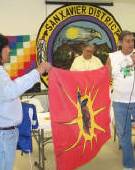WIKILEAKS: Border Guards feared Mohawks
By Brenda Norrell, Censored News, May 23 2011
The US Embassies in Montreal and Quebec monitored Mohawks and Indigenous activists. In a series of cables released by Wikileaks in May, the US Ambassadors in Canada make it clear that no one wants to fight the Mohawks. In fact, the US Embassy in Ottawa points out that the Canadian Border Guards feared the Mohawks.
In a cable dated July 30, 2009, from Ottawa, Terry Breese, deputy chief of mission at the U.S. Embassy, wrote about the Canadian Border Services Agency.
“The CBSA customs post on Cornwall Island (Kawehnoke) located on the Mohawk reserve territory of Akwesasne on the Canada-U.S. border closed on May 31. Canadian border guards had left the post citing fears of a violent confrontation with Mohawk residents, who opposed a CBSA directive requiring border guards to carry firearms at the Canadian port-of-entry, effective June 1.”
The Canadian Border Guards Union said Mohawks were intimidating them.
“The MCA (Mohawk Council of Akwesasne) has accused CBSA agents at the Cornwall island border post of harassment, intimidation, and racial profiling of Mohawk residents, while the border guards’ union has reported that Mohawks on the reserve had harassed and intimidated its members,” Wikileaks said in the July 30, 2009 cable.
A US Embassy cable about Kanesatake in May of 2004 reveals the Quebec Government’s reluctance to engage Mohawks in confrontation. It was written by the U.S. Consul General in Quebec, Susan Keogh-Fisher.
“The Quebec Government wants to avoid a 1996 Oka-type situation where a mechanized brigade had to intervene and there were costly social and political reactions. ‘Anything we do to squash a fly will give rise to huge problems.’ The strategy is to avoid counterreaction and ‘psychodrama’ by keeping a low profile,” US Consul Keogh-Fisher states in the May 17, 2004, cable.
Keogh-Fisher describes the disaster of sending in what is called government-funded “warriors/police.”
“The Charest Government has refused a $1.5 million request by Police Chief Ed Thompson to increase the native police force to 38 people. Thompson and his peacekeepers have never been able to patrol and had to retire after being pelted with rocks and sticks, with minor injuries. Having funded the first group of warriors/police that Gabriel hired earlier this year, who were virtually taken hostage inside Kanesatake, we understand Ottawa is also hesitating to provide more police forces.”
In a second cable about Kanesatake in June 23, 2004, US Consul Bernadette Allen in Montreal writes a long cable describing the failure of bringing in “aboriginal police.”
So far, Mohawks are unimpressed with the cables and have little to say about either the content or the arrogant tone of the US Embassy.
John Kane, Mohawk host of the radio show Let’s Talk Native Pride, said, “I think one of the reasons you haven’t got much response from this is just as you have suggested; it’s no surprise. While some would be outraged to be treated this way or spoken of in such terms, we know what we are up against. We also know that 9-11 was an opportunity for both the US and Canada to put Native resistance on par with terrorism. No Department of Homeland Security or PATRIOT Act or Canadian Border Service or joint task force of US and Canadian alphabet soup will change the disposition of Mohawk Warriors.”
APTN news in Canada reported on the cables, pointing out that Canada called on the FBI for help.
“Mohawks from other reserves continue to arrive in Kanesatake, including some from Colorado, to join in the resistance. Some ‘gun slingers’ have already arrived from the U.S., and more could come,†said APTN, quoting the May 17, 2004 cable and sent by the U.S. consulate in Quebec City.
So far, there has only been only one benign mention of the Zapatistas in the diplomatic cables. However, there are more than a dozen detailed cables about the Mohawks and aboriginal Canadians. Border crossing, land rights and treaties are among the issues.
Earlier in 2010, before Wikileaks dominated the headlines, Wikileaks revealed Canada’s illegal wiretaps of Mohawks.
WIKILEAKS CABLES MOHAWKS:
WIKILEAKS: Border guards feared Akwesasne Mohawks
http://censored-news.blogspot.com/2011/05/wikileaks-border-guards-feared.html
Wikileaks Cable: Mohawks Borders, Land Claims, Treaties
http://censored-news.blogspot.com/2011/05/wikileaks-cable-mohawks-borders-land.html
Wikileaks Montreal Cable: Mohawks June 23, 2004
http://censored-news.blogspot.com/2011/05/wikileaks-montreal-cable-mohawks-2004.html
Wikileaks Cable: Mohawks, Kanesatake, May 17, 2004
http://censored-news.blogspot.com/2011/05/wikileaks-cable-mohawks-kanesatake-may.html
Wikileaks: US and Canadian militaries like a marriage
http://censored-news.blogspot.com/2011/05/wikileaks-us-and-canadian-militaries.html
.
Also see:
Wikileaks: Canada says UN Indigenous Rights Declaration headed for ‘train wreck’
http://bsnorrell.blogspot.com/2011/05/wikileaks-canada-says-un-declaration-on.html
(Aug. 6, 2010) Wikileaks: Canada’s unauthorized wiretap of Mohawks:
http://bsnorrell.blogspot.com/2010/08/wikileaks-canadas-unauthorized-wiretaps.html
Media:
Listen to Let’s Talk Native Pride online:
http://letstalknativepride.blogspot.com/
APTN news article: http://aptn.ca/pages/news/2011/05/03/quebec-asked-for-fbi-help-during-2004-kanesatake-crisis-u-s-diplomatic-cables/
From UN Permanenet Forum on Indigenous Issues, 9th session report 2010:
The Permanent Forum recommends that the Governments of Canada and the United States address the border issues, such as those related to the Mohawk Nation and the Haudenosaunee Confederacy, by taking effective measures to implement article 36 of the United Nations Declaration on the Rights of Indigenous Peoples, which states that indigenous peoples divided by international borders have the right to maintain and develop contacts, relations and cooperation with their own members as well as other peoples across borders.
.
Photo: Indigenous Peoples Border Summit of the Americas, San Xavier 2006, Tohono O’odham. Photo by Brenda Norrell.




